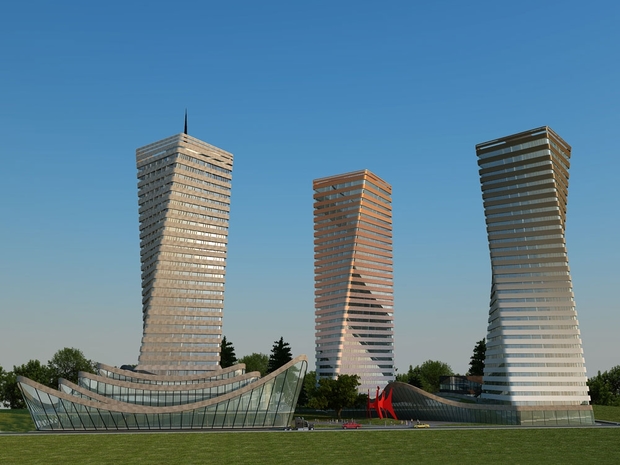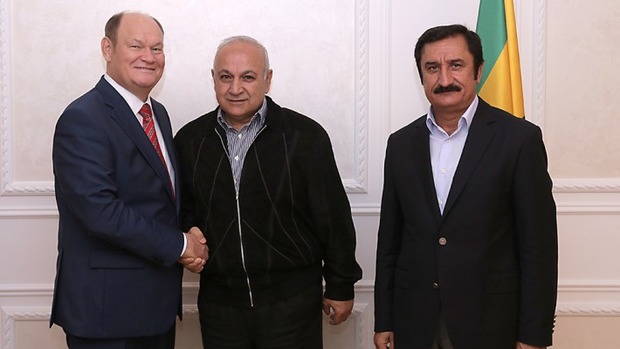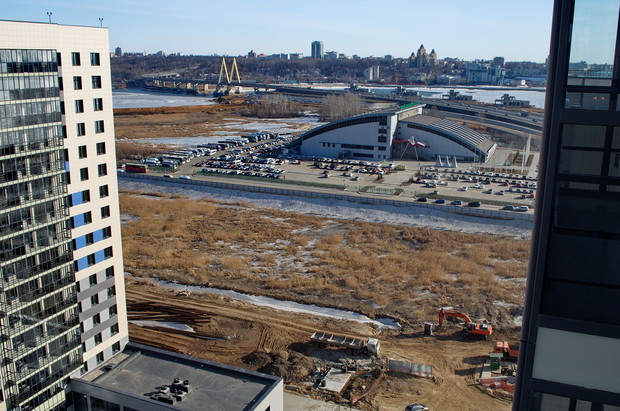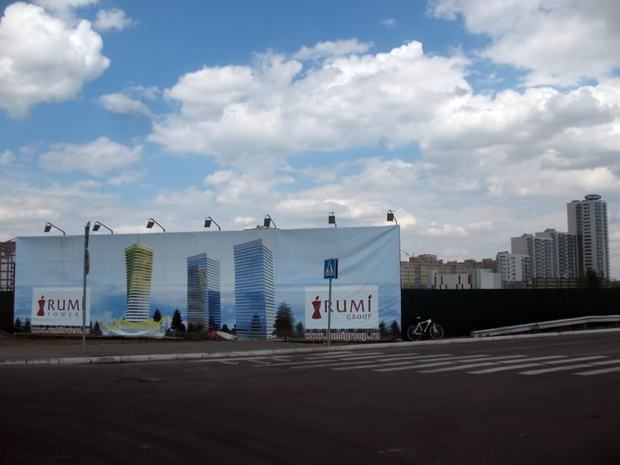The Turks fail the Manhattan project in Kazan
Grid Company intends to arrest the land of a Turkish developer for debts
Grid Company through legal action is trying to arrest the land owned by the Turkish company RUMI Group, the initiator of an ambitious development project on the bank of the Kazanka River — three skyscrapers Fatih, Amir and Khan, for debts. As it became known to Realnoe Vremya, the Turks failed to implement their project (our source believes that they simply bit off more than they could chew) and are seeking for buyers.
Grid Company does not agree to promises
Tatarstan Court of Arbitration will consider the suit of Grid Company on recovery of immovable property of the Turkish developer RUMI Group at the end of November.
Last week, at a meeting Grid Company demanded to declare RUMI Group insolvent. The correspondent of Realnoe Vremya also attended the trial.
The representative of RUMI Group did not attend the meeting. The representative of Grid Company, in his turn, came to abandon their claim. He explained this action to Realnoe Vremya by the fact that, according to the law, Grid Company can't sue for bankruptcy of RUMI Group because the company owes them a forfeit. The act of filing a suit was more of a way to alarm the Turkish builder.
'They have been promising us for year and a half already,' said the attorney of Grid company.
According to the interlocutor, the amount of the debt is nearly half a million rubles. In order to return the money, Grid Company filed a suit to recover immovable property – they are going to arrest or sell the land where RUMI Group was to build skyscrapers.
'We are already on the stage of enforcement proceeding, we are trying to recover money from them. We found their property, land, but we cannot sell it because, according to the Code, we have to wait for a long time before the sale of the land,' continues the lawyer. 'We must first file a separate claim for recovery of the land.'
The cadastral value of the land at Amirkhana Prospekt owned by RUMI Group is about 200 million rubles, but the real cost is even higher, according to the representative of Grid Company.
About how the former founder of RUMI Group was accused of fraud
Six years ago, RUMI Group announced the ambitious project, which involved the construction of three skyscrapers on the bank of Kazan — Fatikh, Amir, and Khan. Thus, the residential complex would have the name of a famous Tatar writer Fatikh Amirkhan.
The project was presented in 2010, but then there was a pause. They started talking about its implementation only in 2013. It seemed that this time the developer had serious intentions — in May 2013, public hearings were held, during which 1.8 hectares of land on Amirkhan Prospekt were transferred to the service area of the population. At the beginning of 2014, RUMI Group received the building permission.
The most unusual was the tower project 'Fatikh' — it was supposed to be curved, and the last floor was to be twisted 45 degrees. It was assumed that the building would have 29 floors and the first two floors would be occupied by fitness and trade, other three floors — offices. The rest of the house was to be residential. Amir, Khan were to be usual 30-story skyscrapers.
According to experts, the project was quite interesting, notable for elaborated details. For example, it implied the existence of interiors, the architects already had thought through even the color of furniture in the apartments at the design stage.

It is worth saying a few words about the builder — the company RUMI Group, the name of which probably echoes the name of a famous medieval poet-Sufi, Rumi, which in its turn comes from the Arabic name of Anatolia/Byzantium — Rum.
According to the Spark system, the company was founded in 2009. The founders of RUMI Group were Kadri Kose and Aydın Mıstaçoğlu. By the way, the latter is well-known in Kyrgyzstan — Aydın Mıstaçoğlu is the owner of one of the largest in the Republic of shopping and entertainment complex Bishkek Park. This March, Temir Sariev, who at that time held the chair of the Prime Minister, appointed him as his advisor on a voluntary basis. However, already in April, Sariev had to leave the post of Prime Minister. In May, Aydın Mıstaçoğlu was charged with fraud. As Kyrgyz media reported, the case was initiated at the request of Plus Investment Group PLC on the fact of non-payment of funds. However, later, the company managed to negotiate — the management of Bishkek Park indemnified them, and all the charges were dropped.
Now Aydın Mıstaçoğlu is not in the list of founders of RUMI Group. According to Spark, since 2013 the company has two owners — Kadro Kose, who is also the director of RUMI Group, and Ali Aykut, he owns a share of 80%.
About love to embankments
It is noteworthy that the construction of high-rise buildings Fatikh, Amir, and Khan in Kazan is not the only project that RUMI Group was going to implement in Russia.
In 2014, the representatives of Turkish company met with the governor of Penza Oblast Vasily Bochkarev. Here the builder, as in the case of Kazan, was interested in the riverside zone — he was going to reconstruct the embankment of the Sura River.

In Penza, the investors were warmly welcomed in the hope that region's economic potential would grow due to them.
'Penza Oblast is open for mutually beneficial cooperation with investors. We are ready to realize joint works,' said governor Vasily Bochkarev.
However, in the case of Penza, they did not reach even the discussion of concrete projects.
We failed to reach RUMI Group by phone. We sent written requests to Grid Company and to the press service of the Kazan mayor's office, however the responses have not been received.
According to the sources of Realnoe Vremya familiar with the situation, it is known that the towers on Amirkhan Prospekt definitely will not be built — RUMI Group is already seeking buyers for the land. A probable reason why the company has not commenced the implementation of the project, they call the overestimation by the developer of its capabilities.
Besides, it is known that the riverside site, where they were going to build Fatikh, Amir, and Khan, may be flooded under certain conditions. However, experts believe that it can hardly be considered a significant problem — it is only needed to build treatment facilities.

Who bankrupted RUMI Group?
In total, Tatarstan Court of Arbitration has three claims on bankruptcy in relation to RUMI Group. However, in these cases most often it was about small amounts. The first one was filed in last September by Khanty-Mansi company Erel Gazstroy PLC.
The second claim came from the Federal tax service in July 2016. However, it was dismissed because the representatives of RUMI Group proved that by the court hearing the debt to the Federal tax had already been redeemed.
And finally, the third claim was from Grid Company in October. We have already mentioned about its fate — the application was withdrawn, and instead, they filed another lawsuit for recovery of property. According to data published on the website of Court of Arbitration, RUMI Group previously owed 9.1 million rubles to Grid Company. This amount was repaid by the developer. But still they had a penalty in the amount of 644 thousand rubles, which the debtor had to pay by parts. Apparently, this amount was a new reason for the lawsuit from RUMI Group.
 The project was presented in 2010 for the first time. Photo: skyscrapercity.com (Askario), July, 2010
The project was presented in 2010 for the first time. Photo: skyscrapercity.com (Askario), July, 2010